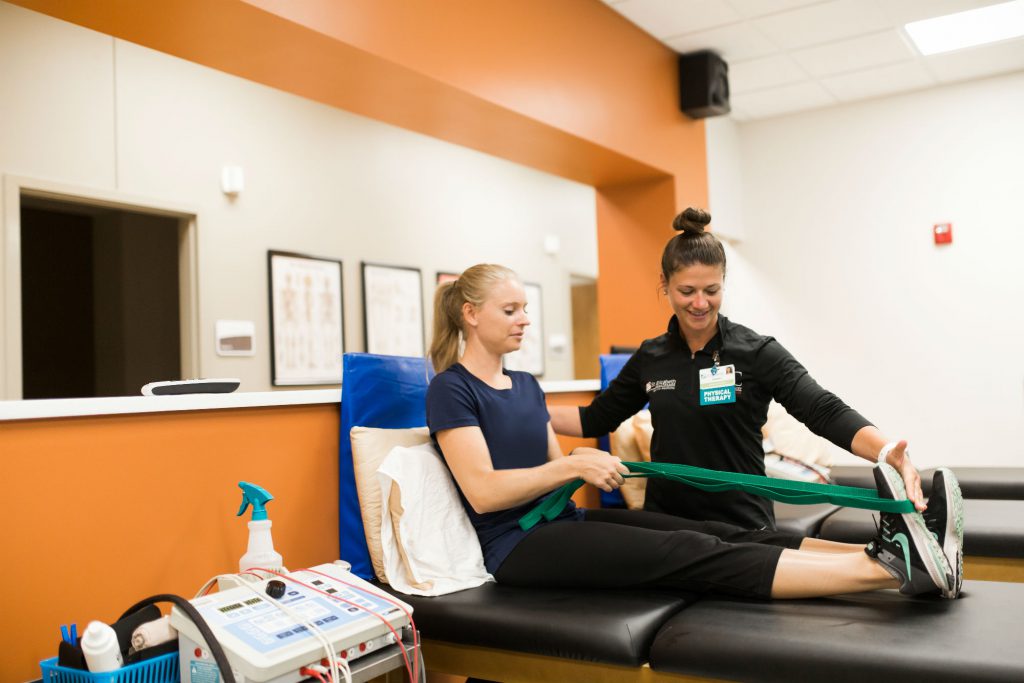This summer, as you head out for a pickup basketball game or a fierce tennis match with your old high school friend, remember one thing—warm up properly before hitting the court.
“The middle-aged athlete, between the ages of 30-50, are the most common people I see with Achilles tendon tears,” says Dr. Nicholas Gates, an affiliated orthopaedic foot and ankle specialist at OrthoCincy Orthopaedics & Sports Medicine. Dr. Gates specializes in the reconstruction of the foot and ankle and performs surgeries at St. Elizabeth Healthcare.
He adds, “There is a combination of factors that make the middle-aged athlete more prone to a tear. As you get a little older, you gradually lose flexibility in your Achilles tendon, you don’t spend as much time conditioning for competitive sports and you have a decreased blood supply to that area of your foot.”
Prevention of an Achilles Tendon Tear
The Achilles tendon is the largest and strongest tendon in the human body. In a study published in Foot & Ankle International, researchers found an estimated 83 percent of tears occurred in men around age 46, and sports activities caused 68 percent of the injuries.
Dr. Gates says, “When you get older, you are likely rushing from work to fit in some physical exercise, and you don’t take the necessary time to warm up prior to jumping into a pickup game or going for a run.”
Regular stretching and strengthening of your Achilles tendon is the best way to prevent an injury.
Dr. Gates adds, “I know preventing a rupture sounds simple, but you have to be committed to warming up, stretching and staying conditioned for the type of sports you want to play.”
Symptoms of an Achilles Tendon Tear
Symptoms of an Achilles tendon tear are often ignored or diagnosed incorrectly.
Symptoms include:
- The feeling of having been kicked in the calf or heel.
- A popping or snapping sound when the injury occurs.
- Pain and swelling near the heel.
- A weakness in the calf and foot of the injured leg.
Dr. Gates explains the classic symptom is the feeling of having been kicked in the calf or foot and the feeling or sound of a “pop” during activity. He says, “Some athletes feel the snap or pop and have extreme pain for a few minutes. Then, the pain goes away and they can walk on it normally. Because the pain may subside quickly, the symptoms are often ignored.”
Dr. Gates recommends that if you hear the classic pop or snap sound in your foot, you should be seen by a sports medicine specialist right away. Waiting to get treatment could make treatment more difficult and allow scar tissue to form.
Treatments of an Achilles Tendon Tear
An Achilles tendon tear is repaired with surgery. Depending on the type and location of the tear, the repair can be done using minimally invasive surgical techniques.
“The newer minimally invasive surgical techniques give patients less pain and a quicker recovery,” says Dr. Gates.
Patients are typically on crutches for approximately two weeks and start physical therapy when they are off crutches and in a walking boot. Most patients return to their daily activities within six weeks and can participate in sports within three to six months.
Dr. Gates warns, “Don’t ignore the symptoms. Waiting could make the surgery much more difficult. If you wait, we would be rebuilding the tendon rather than repairing it.”
If you think you have suffered a tear and would like to schedule an appointment, please call our affiliated orthopedic surgeons from OrthoCincy Orthopaedics & Sports Medicine at (859) 301-BONE (2663).

